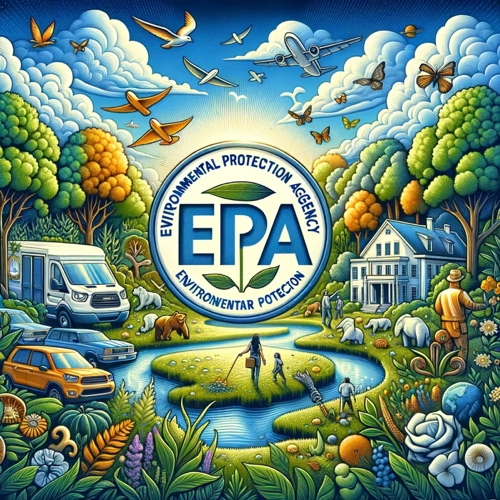Bra podd
Sveriges mest populära poddar

Environmental Protection Agency (EPA) News
EPA's Sweeping Reforms: Boosting Biofuels, Slashing Regulations, and Shifting Power to States
3 min • 27 juni 2025
Welcome to the Environmental News Roundup, where we break down the top developments from the Environmental Protection Agency. The biggest headline this week is the EPA’s major proposal to set new Renewable Fuel Standard requirements through 2027. This move not only aims to boost American energy security but is being called by EPA Administrator Lee Zeldin “the boldest proposal ever” for the biofuels industry. The plan is intended to benefit American farmers, lower gas prices, and keep the U.S. less reliant on foreign energy sources. Secretary of Agriculture Brooke Rollins called it a “strong signal to the U.S. biofuels industry that President Trump has their backs,” emphasizing the importance of American-grown fuels for both rural economies and national security.
This announcement comes at a time of sweeping change for the EPA. In March, Administrator Zeldin announced 31 major deregulatory reforms, describing them as the “biggest deregulatory action in U.S. history.” These reforms aim to reduce regulatory burdens, promote domestic energy, and return decision-making authority to states. Key areas being reconsidered include greenhouse gas limits on power plants, methane regulations for oil and gas, and mercury standards for coal-fired plants. According to EPA estimates, these measures could reduce regulatory costs by trillions of dollars, potentially lowering living costs for families and operational costs for businesses nationwide.
On the funding front, the EPA just awarded $3.7 million in grants to four organizations to help farmers in the Western Lake Erie Basin with nutrient management. This supports both environmental protection and agricultural productivity, a win-win for rural communities.
But not all news is positive—several environmental groups have taken legal action against the EPA after recent funding cuts, with multiple lawsuits challenging the administration’s decisions. While some nonprofits have successfully had grant funding restored during appeals, others struggle due to limited resources, highlighting the broader impacts of policy shifts on local organizations.
For American citizens, these changes could mean lower fuel and energy prices, but also shifts in environmental standards that may affect air and water quality. Businesses, especially in energy and agriculture, are likely to see major changes in compliance costs and market opportunities. State and local governments will have more say under the new cooperative federalism push, but also greater responsibility. Internationally, President Trump’s deal with the UK to eliminate ethanol tariffs signals a renewed emphasis on exporting American-grown fuels.
For those interested in shaping these changes, the EPA has opened a public comment period on the proposed power plant climate rules and the Renewable Fuel Standard—now is the time to share your views. Keep an eye out for final rulings on these policies and ongoing court decisions that could influence environmental programs nationwide.
Thanks for tuning in. Don’t forget to subscribe for weekly updates on the environment, policy, and your world. This has been a Quiet Please production, for more check out quiet please dot ai.
This announcement comes at a time of sweeping change for the EPA. In March, Administrator Zeldin announced 31 major deregulatory reforms, describing them as the “biggest deregulatory action in U.S. history.” These reforms aim to reduce regulatory burdens, promote domestic energy, and return decision-making authority to states. Key areas being reconsidered include greenhouse gas limits on power plants, methane regulations for oil and gas, and mercury standards for coal-fired plants. According to EPA estimates, these measures could reduce regulatory costs by trillions of dollars, potentially lowering living costs for families and operational costs for businesses nationwide.
On the funding front, the EPA just awarded $3.7 million in grants to four organizations to help farmers in the Western Lake Erie Basin with nutrient management. This supports both environmental protection and agricultural productivity, a win-win for rural communities.
But not all news is positive—several environmental groups have taken legal action against the EPA after recent funding cuts, with multiple lawsuits challenging the administration’s decisions. While some nonprofits have successfully had grant funding restored during appeals, others struggle due to limited resources, highlighting the broader impacts of policy shifts on local organizations.
For American citizens, these changes could mean lower fuel and energy prices, but also shifts in environmental standards that may affect air and water quality. Businesses, especially in energy and agriculture, are likely to see major changes in compliance costs and market opportunities. State and local governments will have more say under the new cooperative federalism push, but also greater responsibility. Internationally, President Trump’s deal with the UK to eliminate ethanol tariffs signals a renewed emphasis on exporting American-grown fuels.
For those interested in shaping these changes, the EPA has opened a public comment period on the proposed power plant climate rules and the Renewable Fuel Standard—now is the time to share your views. Keep an eye out for final rulings on these policies and ongoing court decisions that could influence environmental programs nationwide.
Thanks for tuning in. Don’t forget to subscribe for weekly updates on the environment, policy, and your world. This has been a Quiet Please production, for more check out quiet please dot ai.
Senaste avsnitt
00:00 -00:00